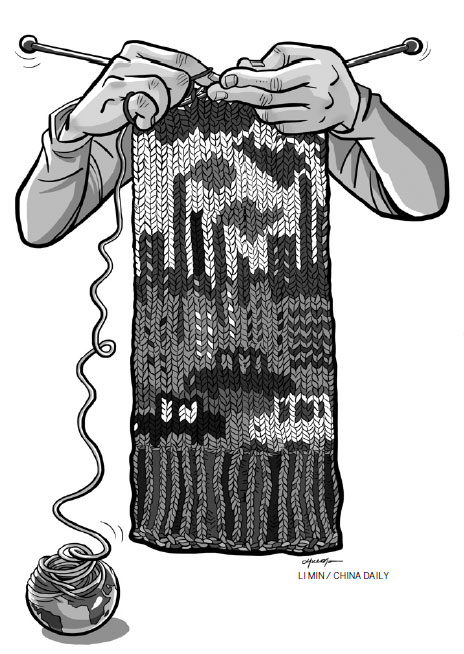Waste-not-want-not path to green economy
Updated: 2015-06-06 08:09
By Achim Steiner(China Daily)
|
||||||||
As we sat down for lunch or dinner on World Environment Day on Friday, it was an important time to consider this: one-third of all food produced across the world every year - 300 million tons - is wasted. This waste costs the global economy a staggering $1 trillion a year.
Industrialized regions account for almost half of the total waste. Most of the food we discard is still fit for human consumption and could feed more than 800 million people. This is just the tip of the waste iceberg, and serves as a proxy for the "ecological footprint" of our entire global economy.
Our global food system is responsible for 80 percent of deforestation and is the largest single cause of species and biodiversity loss. It is also responsible for more than 70 percent of freshwater consumption. A beef burger on your lunch plate could require an incredible 2,400 liters of water to produce. Would you like fries with that? Add another 100 liters, not to mention the impact of pesticides and non-degradable packaging.

Bon appetit!
Here is another startling truth: Our global consumption is already one-and-a-half times the Earth's carrying capacity. If current population and consumption trends continue, humanity will need the equivalent of two Earths to support itself by 2030.
With the global population forecast to reach 9 billion by mid-century, demands on these depleting resources will only compound, exacerbated by increasing pollution, conflicts over resources and the effects of an atmosphere being rapidly heated by human greenhouse gas emissions, all of which could substantially lower global GDP. Record droughts, floods, choking air pollution and species threatened with extinction have become a regular feature in our daily news.
While some may dream of colonizing other planets, we cannot escape the conclusion that on this Earth, "business-as-usual" cannot maintain our 21st century lifestyles, let alone trying to lift 1 billion people out of absolute poverty and accommodate an additional 1-to-3 billion middle-class consumers.
Our only choice to grow our economies is to radically increase what economists call "productivity" - doing more with less. We must shift patterns of both our production and consumption from our current linear economic system of extraction, production, consumption and waste, to an inclusive green economy that mimics natural processes where there is no concept of "waste" - just food for another organism or process.
- Global health entering new era: WHO chief
- Brazil's planning minister steps aside after recordings revelation
- Vietnam, US adopt joint statement on advancing comprehensive partnership
- European border closures 'inhumane': UN refugee agency
- Japan's foreign minister calls A-bombings extremely regrettable
- Fukushima impact unprecedented for oceans: US expert

 Stars of Lijiang River: Elderly brothers with white beards
Stars of Lijiang River: Elderly brothers with white beards
 Wealthy Chinese children paying money to learn British manners
Wealthy Chinese children paying money to learn British manners
 Military-style wedding: Fighter jets, grooms in dashing uniforms
Military-style wedding: Fighter jets, grooms in dashing uniforms
 Striking photos around the world: May 16 - May 22
Striking photos around the world: May 16 - May 22
 Robots help elderly in nursing home in east China
Robots help elderly in nursing home in east China
 Hanging in the air: Chongqing holds rescue drill
Hanging in the air: Chongqing holds rescue drill
 2.1-ton tofu finishes in two hours in central China
2.1-ton tofu finishes in two hours in central China
 Six things you may not know about Grain Buds
Six things you may not know about Grain Buds
Most Viewed
Editor's Picks

|

|

|

|

|

|
Today's Top News
Liang avoids jail in shooting death
China's finance minister addresses ratings downgrade
Duke alumni visit Chinese Embassy
Marriott unlikely to top Anbang offer for Starwood: Observers
Chinese biopharma debuts on Nasdaq
What ends Jeb Bush's White House hopes
Investigation for Nicolas's campaign
Will US-ASEAN meeting be good for region?
US Weekly

|

|









